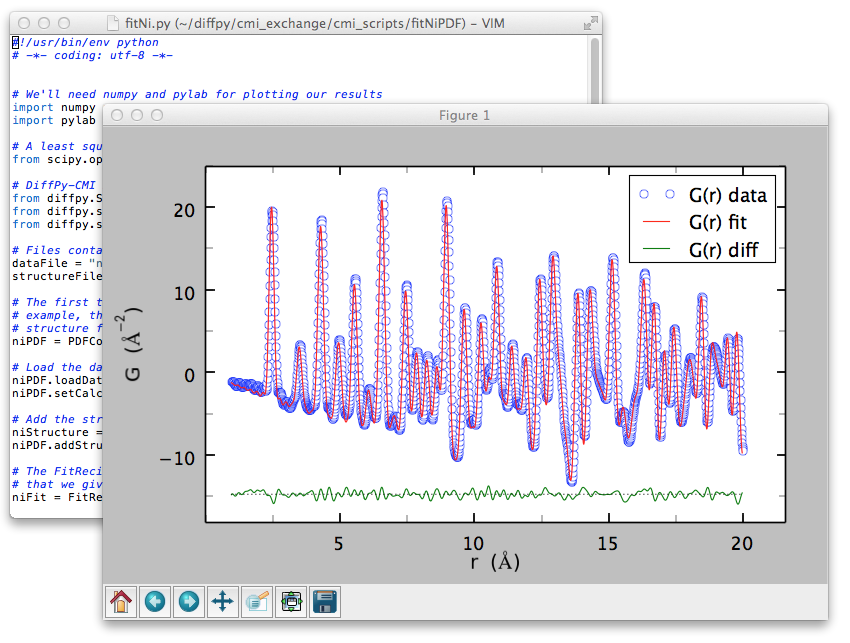DiffPy-CMI¶
DiffPy-CMI is our complex modeling framework. It is a highly flexible library of Python modules for robust modeling of nanostructures in crystals, nanomaterials, and amorphous materials.
The software provides functionality for storage and manipulation of structure data and calculation of structure-based quantities, such as PDF, SAS, bond valence sums, atom overlaps, bond lengths, and coordinations. Most importantly the DiffPy-CMI package contains a fitting framework for combining multiple experimental inputs in a single optimization problem.
This is an early release of code that is under intense development, with support for installation on Unix, Linux, and Macintosh machines. The scope and documentation of the project will evolve rapidly, but we want to make the code available at the earliest possible date. Please make use of the software and provide feedback and suggestions for improvement, but please be patient and check back frequently for updates.

Installation¶
Use of this software is subject to the conditions in software LICENSE.
As of version 3.0 DiffPy-CMI is available for Linux and Mac as a collection of packages for Anaconda Python. As a first step download and install Anaconda for Python 3.7 from https://www.anaconda.com/distribution.
Note
DiffPy-CMI is available from the “diffpy” channel of Anaconda packages. It requires Python 3.5 or later or 2.7. It is recommended to install it in a separate Anaconda environment, for example py37 or other preferred python versions. Make sure that py37 environment is activated when working with DiffPy-CMI.
conda create --name=py37 python=3.7
conda activate py37
Once Anaconda is ready, DiffPy-CMI can be installed from the “diffpy” channel of Anaconda packages as follows
conda config --add channels diffpy
conda install diffpy-cmi
The software distribution over Anaconda makes it easy to publish frequent software updates. To update your installation later use
conda update diffpy-cmi
If you don’t want to use Anaconda you can install DiffPy-CMI from sources. Note that this method takes more time and requires more experience with the operating system.
What next?¶
Explore CMI exchange, our collection of example scripts and tutorials
Tutorials¶
ADD2019 school and conference – https://github.com/diffpy/add2019-diffpy-cmi
Documentation¶
Documentation for packages developed by the DiffPy team is available at the links below.
diffpy.srfit – configuration and control of data-fitting problems
diffpy.srreal – calculators for pair distribution function, bond valence sums, etc.
diffpy.structure – light-weight representation of crystal structures
pyobjcryst – Python interface to ObjCryst++ crystallographic library
diffpy.utils – general purpose utilities for the diffpy libraries
libdiffpy – C++ library for calculation of PDF and other real-space quantities
See DiffPy-CMI contents for a complete list of open-source libraries that are included in DiffPy-CMI and their respective project pages.
Reference¶
If you use this software in a research work which leads to publication, we ask you to acknowledge the use of DiffPy-CMI by citing the following paper:
P. Juhás, C. L. Farrow, X. Yang, K. R. Knox and S. J. L. Billinge, Complex modeling: a strategy and software program for combining multiple information sources to solve ill posed structure and nanostructure inverse problems, Acta Crystallogr. A 71, 562-568 (2015).
